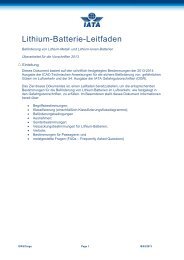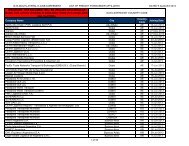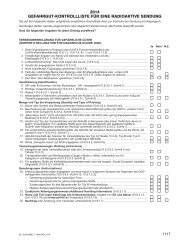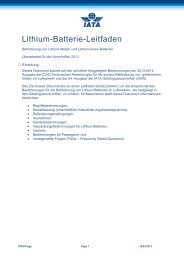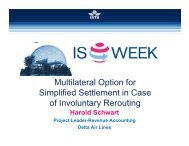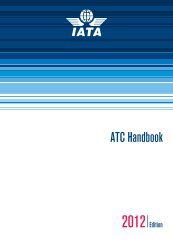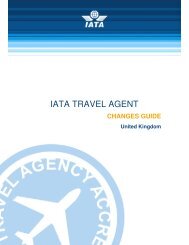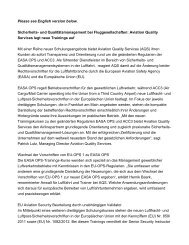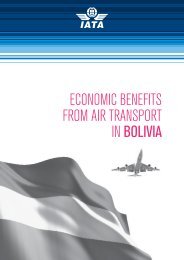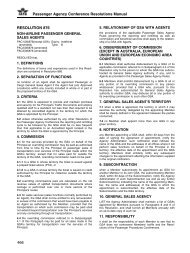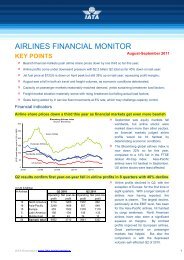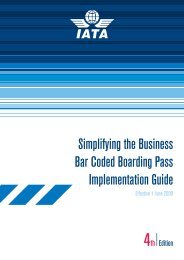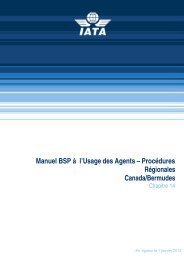Create successful ePaper yourself
Turn your PDF publications into a flip-book with our unique Google optimized e-Paper software.
Weak targets and even<br />
weaker resolve is undermining<br />
progress toward a Single<br />
European Sky (SES).<br />
The same cost pressures that<br />
are pushing on airport charges<br />
are also affecting ANSPs.<br />
<strong>IATA</strong> continues to campaign<br />
for reductions in air navigation<br />
charges. It also calls for fairer<br />
pricing regimes to incentivize<br />
efficiency improvements in air<br />
traffic management.<br />
<strong>IATA</strong>’s close work with the<br />
European Commission on a<br />
more unified European airspace<br />
has helped to finalize the SES<br />
performance and charging<br />
scheme regulations, resulting in<br />
an end to the full cost recovery<br />
mechanism and a fairer scheme<br />
based on sharing risk in traffic<br />
volumes between airlines and<br />
ANSPs.<br />
The success of the SES<br />
Performance Scheme is at risk,<br />
however. Despite the fact that<br />
countries agreed in 2010 to<br />
cost reductions at an EU-wide<br />
level of 3.5% per year from<br />
<strong>2012</strong> through 2014, their<br />
National Performance Plans<br />
submitted in December 2011<br />
indicate a shortfall of 1.7%, or<br />
$171.8 million (€133 million) in<br />
2014. Moreover, the plans also<br />
fail to comply with the delay<br />
targets set at an EU-wide level.<br />
This is the first reference period<br />
under the Single European<br />
Sky Performance Scheme<br />
legislation, and its success or<br />
failure will set a precedent for<br />
all future reference periods.<br />
If the shortfalls are not remedied<br />
by the Commission, the<br />
Performance Scheme will lose<br />
its credibility.<br />
In a related matter, all EU<br />
Member States need to join<br />
Functional Airspace Blocks<br />
(FABs) by 4 December<br />
<strong>2012</strong>, according to the SES<br />
II legislation. Although little<br />
was done in 2011 to achieve<br />
this goal—only Denmark and<br />
44<br />
Sweden made progress during<br />
this period—evidence from<br />
early <strong>2012</strong> suggests that more<br />
states are working toward FAB<br />
implementation. However, <strong>IATA</strong><br />
has already noted significant<br />
missed opportunities for cost<br />
efficiencies, as ANSPs are still<br />
aiming to keep separate operations<br />
rather than work under a<br />
single FAB.<br />
Meeting the SES targets is<br />
critical to European competitiveness—ensuring<br />
airspace capacity,<br />
improving safety, cutting<br />
emissions, and halving costs.<br />
<strong>IATA</strong> will continue to press for<br />
tougher action by the European<br />
Commission and for more challenging<br />
performance targets<br />
from 2015.<br />
The Single European Sky needs<br />
every European nation to cooperate<br />
for airspace reform and efficiency<br />
improvement. But only Denmark<br />
and Sweden are on schedule to<br />
establish a functional airspace<br />
block by the end of <strong>2012</strong>.<br />
The regulatory oversight<br />
of activities related to the<br />
jet fuel supply chain and<br />
refueling services must be<br />
strengthened.<br />
Monopolistic fuel suppliers and<br />
a lack of cost transparency<br />
holds aviation back in several<br />
key markets. Campaigns continue<br />
for the improved transparency<br />
of costs and formula<br />
prices based on international<br />
standards in Angola, Brazil,<br />
China, the Republic of Congo,<br />
the Dominican Republic,<br />
Kazakhstan, Mexico, Qatar, the<br />
Russian Federation, and the<br />
Ukraine. <strong>IATA</strong> is also working<br />
to ensure that regulations<br />
introduced in the Russian<br />
Federation to favor open<br />
markets result in a gradual shift<br />
away from the monopolistic fuel<br />
supply situation at the federation’s<br />
airports.<br />
Fuel supply reliability remains<br />
an area of <strong>IATA</strong> activity. In<br />
2011, this included airportspecific<br />
improvements, such as<br />
in jet fuel tankage and supply<br />
capacity, at London Heathrow,<br />
Nice, and various African<br />
locations.



